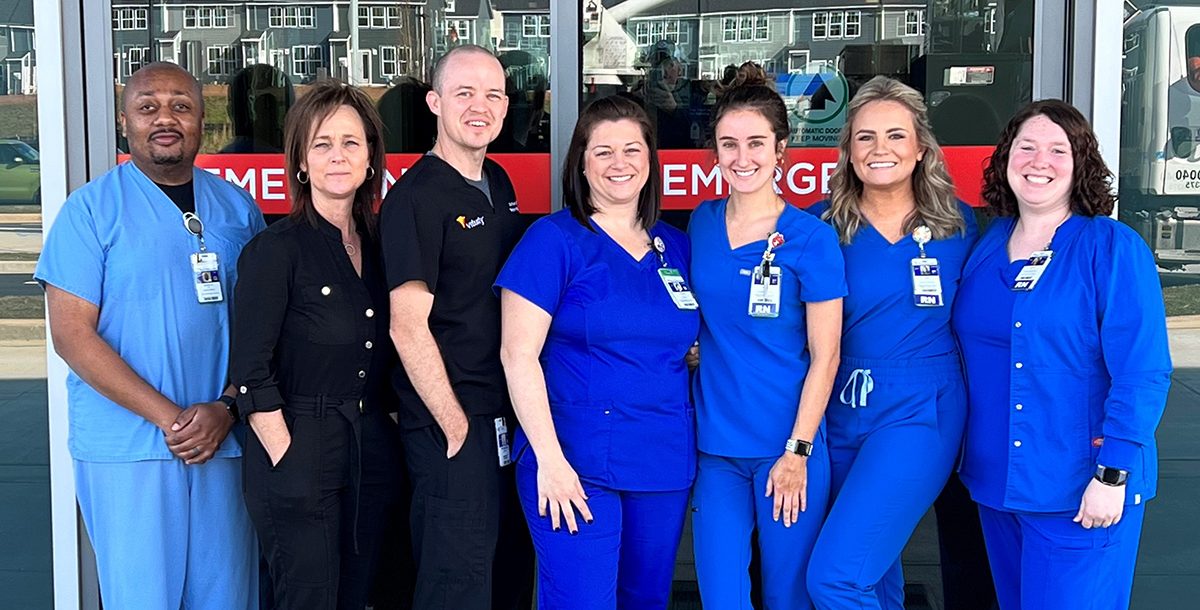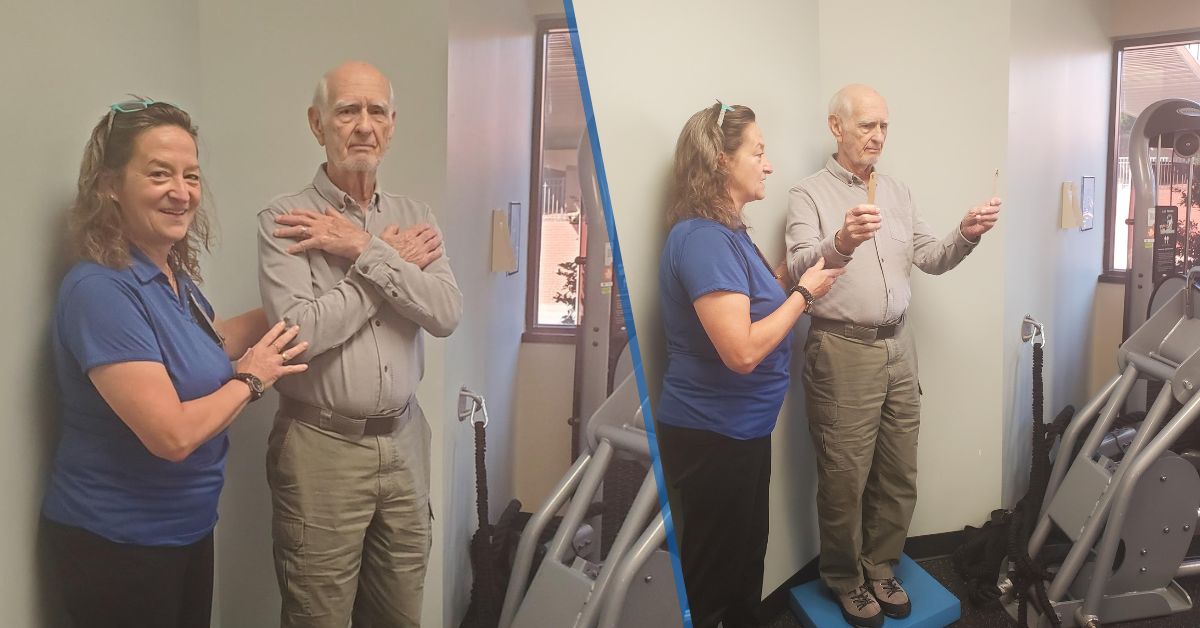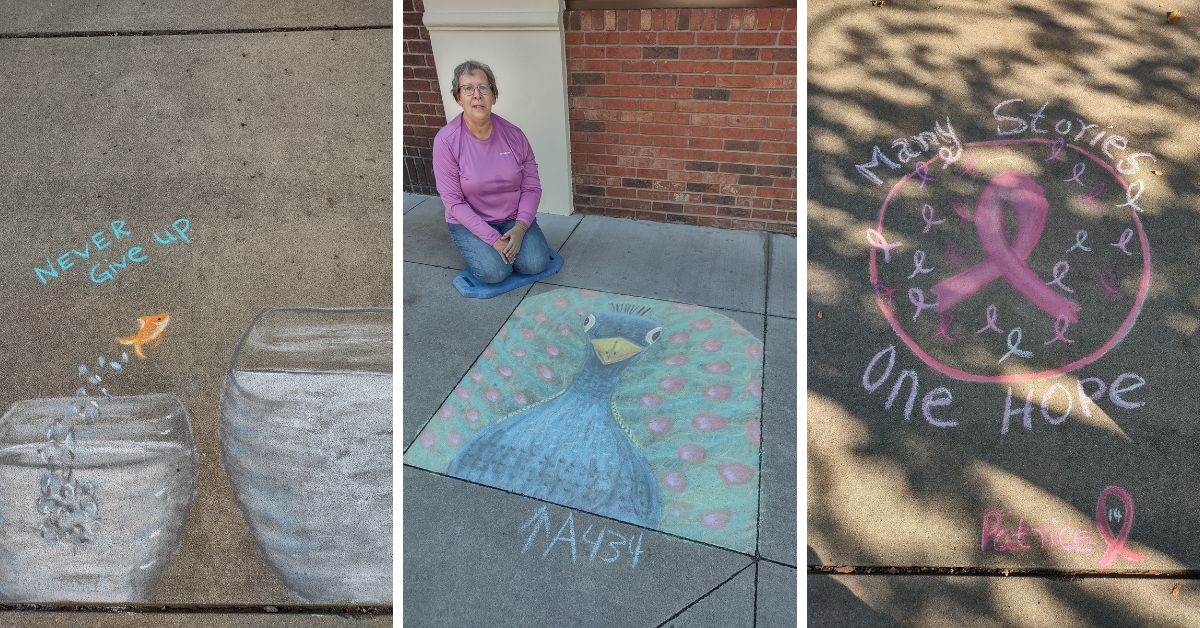Ryan Brown, MD, (pictured above with his team, on the far left) was one of the first team members in line when we began vaccinating our frontline workers in December of 2020.
“Any potential trepidation I had was outweighed by my seeing the severity of COVID-19 and how it’s impacting multiple people in different ways,” Dr. Brown, an emergency medicine physician with Bon Secours St. Francis for nearly 10 years, explains. “There were days where you’d see very sick family members coming in by the twos and threes.”
Dr. Brown received his first dose of the COVID-19 vaccine on Dec. 16, 2020 followed by a second dose around three weeks later, on Jan. 7, 2021. He says his experience was a positive one.
“I may have noticed some soreness in my arm a day or two after, but with both of my doses, I got my vaccine and went straight to work,” he recalls. “It may have been a mind over matter thing, but I really had no symptoms at all – no bad fatigue, fever, body aches or headaches – nothing like that.”
Fast forward to the fall of 2021, Dr. Brown made sure to get his COVID-19 booster shot, too.
“I received my booster on Oct. 8, 2021,” he shares. “It has been obvious over the last months how important being fully vaccinated, including being boosted, has helped in slowing down this virus. The numbers of COVID-related deaths have drastically been reduced due to these efforts.”
National, state and local statistics show that African American communities have been disproportionately affected by COVID-19, but that this community is less likely to get vaccinated. April is Minority Health Month and this year’s theme is “Give Your Community a Boost!” with a focus on how the COVID-19 vaccine and boosters are the strongest tools we have to end this pandemic.
All of this is why Dr. Brown feels it is important for him to share his own personal experience. He believes some of the disparity in who is getting vaccinated is based on mistrust.
“This is a complicated problem, particularly in minorities because of the history – being disparaged, not being included in clinical trials, but also being concerned that they may be taken advantage of when you think back to situations like the Tuskegee Experiment. The list is long.”
A complicated problem doesn’t have an easy solution, but Dr. Brown thinks the best place to start is by stopping the spread of misinformation. He believes the internet is only part of this problem.
“The internet can make it hard for people to delineate what information is good and what information is bad,” he shares. “I think finding a trusted source is complicated, because you have to start with some type of knowledge. There may be this awesome study, but if you can’t decipher what it means, it’s hard to trust that information. It can be difficult for the average person to look at a scientific study and tease out enough information to fully understand it.”
Instead of searching online for answers or trying to decipher the terms of a medical journal, Dr. Brown suggests people go to trusted health agencies for answers. The CDC, state health departments and most local health care systems regularly update information on their websites that has been verified by medical professionals. If someone still feels unsure, Dr. Brown encourages them to talk directly to their primary care provider.
“Primary care offices are the best public health educators for most people. They deal with a lot of different problems across a large subset of different patients. There you can speak to someone who knows your medical history as well as your family’s. They can help guide you in decisions that are best for you and your loved ones.”
Still, Dr. Brown believes building trust in the medical field goes beyond knowing where to look for answers. It also means providing more representation.
“If they can see minority scientists or physicians, or hear their opinions more, that may potentially help. Even just raising more awareness about the people behind the scenes – like the names of the people who’ve helped develop the vaccines,” he says, referencing Kizzmekia Corbett, Ph.D. Dr. Corbett is an African American woman from North Carolina, a research fellow and a scientific lead at the National Institute of Health. She was on the team of scientists who studied the COVID-19 vaccine.
Back to Minority Health Month, Dr. Brown emphasizes that while COVID-19 vaccine education and awareness is very important, there are also many other concerns when it comes to the health of this population.
“Minority Health Month is hopefully a time where we can shift our focus to those issues that are at the forefront of minority patients,” he says. “Health care concerns will always vary person to person. However, if you step back, you will notice those concerns can be similar amongst particular racial or socioeconomic groups. In my opinion one of the largest concerns among minorities, which was amplified by the COVID-19 pandemic, was obtaining access to health care.”
As for what everyone can do to stay healthy and advocate for their own health, Dr. Brown shares that prevention is key.
“There are many diseases that can be avoided. Vaccines are one tool, but living a healthy lifestyle is most important,” he adds. “A start would be to identify short-term and long-term goals for your health. Often setting good short-term goals help foster a long-term healthy lifestyle. Whether that includes diet changes, weight loss, exercise, tobacco and alcohol cessation; these are just some to name a few. Last but not least, it is paramount to have health insurance, whether that is through private means or government assistance.”
Stay updated on what Bon Secours is doing related to COVID-19.





